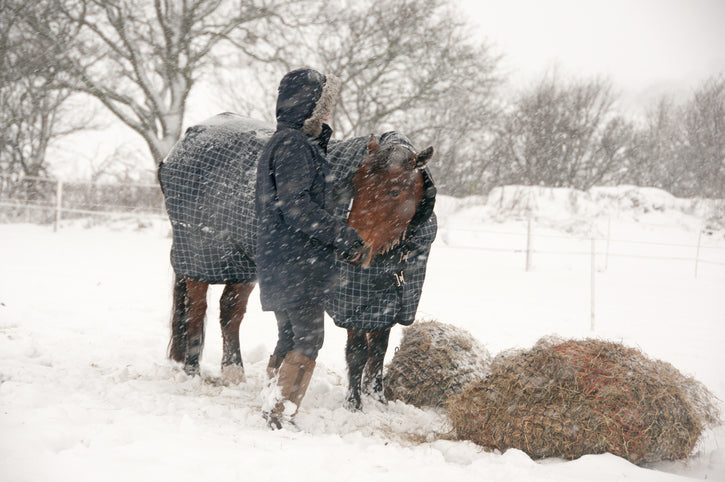Blanketing your horse in the winter months
The winter months will be upon us before you know it and with the change in weather, the question to blanket or not to blanket is bound to come up. In this post, we will take a look at the pros and cons of blanketing and how to do it correctly.
If your horse has been allowed to grow a full winter coat, that winter coat is more than capable of keeping them warm provided they have shelter from the wet weather. If it’s raining out, the wet weather will flatten the hair coat and destroy those insulating qualities. In this case, you’ll need to make sure you have a well rated water-proof winter blanket or a shelter for your horse to stand under. Similarly, if your horse has even a light blanket/sheet on, the hair will no longer be able to stand up and will lose all of its insulating qualities. You shouldn’t put just a light blanket on – you really need to go all the way with a fully rated winter blanket, have blankets available for different temperatures or let them grow out a hair coat.
If your horse has been body clipped or has not grown a full coat, they will probably need to be blanketed during the really cold months.
Plenty of responsible horse owners have happy horses without blankets. There are, however, some prerequisites to this strategy.
- Your horse needs a full winter coat to protect them from the elements.
- Your horse should have some sort of shelter. A three-sided shed is quite adequate. You may be able to use a windbreak in the form of a wall or line of trees. Three sided sheds should be south facing and big enough to allow room for all horses into the shed. Check out our blog about shelters here: https://www.hoof-it.com/blogs/hoof-it/does-your-horse-really-need-a-shelter you can also check out our blog about preparing your horse for winter here: https://www.hoof-it.com/blogs/hoof-it/horse_winter
- Is the weather going to be wet? If so, that rain will wet down the horse’s hair coat. Once that coat is laying flat, it loses its insulating qualities. You’ll probably need a waterproof blanket unless your horse uses a shed consistently.
- They need to have plenty of water. Make sure it is easily accessible and not frozen over.
- They need to have plenty of forage available. Your forage can be in the form of long stem hay or hay cubes or various other forage sources, but it needs to be available because foraging keeps them warm. You can read what Dr. Howard Ketover says about feeding your horse in the winter to understand why forage is so important.
-
Your horse's age matters. Your horse may need a blanket if they’re very young or very old. The very young and the very old may require blanketing to help them maintain their body temperature. Blanketing is also very important if your horse has been ill or is in poor body condition.

GETTING THE RIGHT BLANKET
- It should be well fitted so that they don’t rub at the withers or the shoulders.
- The blanket straps should be fitted close to their body so that they don’t get their legs tangled and it limits the blanket from slipping and rubbing.
- It needs to be rated for the weather they’re turned out in. If they’re rated for colder weather, they may get warm and start sweating. If they’re wearing a blanket that’s not rated heavily enough for the cold weather that they’re in, then that blanket is laying their hair coat down and is probably doing them more damage than good in terms of keeping them warm. This may mean that you need to have more than one blanket for the fall and winter seasons.
- If your horse is out in the rain or sleet, they should be in a waterproof blanket. That may be a waterproof sheet that’s thrown over a heavier blanket or a waterproof blanket. Again, if they get soaked through the blanket, they lose the insulating ability of the blanket as well as the hair coat.
- The blanket should be checked and removed every couple of days. You’ll need to do this to make sure it is still fitting the way it should, and so that you can check the horse’s body condition under the blanket to make sure they haven’t lost too much weight in the cold weather.
Taking these steps will ensure that your horse is warm and healthy through the winter months.


